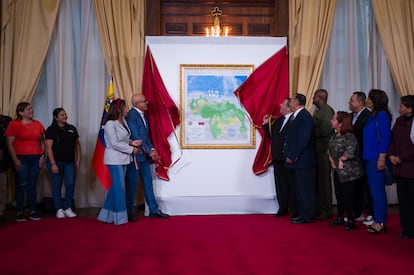Guyana says it refuses to bow to Venezuela in dispute over territory rich in oil and minerals
The statement was issued shortly before Guyanese President Irfaan Ali and Venezuelan President Nicolás Maduro met on the eastern Caribbean island of St. Vincent

Guyana refuses to bow to Venezuela in their dispute over an oil- and mineral-rich territory claimed by both nations, the smaller country said Thursday as its president met Venezuela’s leader in the latest chapter of their bitter rivalry.
Which nation controls Essequibo, a vast border region located along Venezuela’s border, “is not up for discussion, negotiation or deliberation,” Guyana’s government said.
The statement was issued shortly before Guyanese President Irfaan Ali and Venezuelan President Nicolás Maduro met on the eastern Caribbean island of St. Vincent. They clasped hands as leaders around them clapped, then sat down behind closed doors.
Maduro said ahead of the meeting that, “we will make the most of it so that our Latin America and the Caribbean remains a zone of peace.”
The tension over Essequibo has raised worries about a military conflict, even though many believe that unlikely.
White House National Security Council spokesman John Kirby said that Biden administration officials were closely monitoring the rising tensions.
“We don’t want to see this come to blows,” Kirby said. “There’s no reason for it to and our diplomats are engaged in real time.”
The dispute over Essequibo escalated when Venezuela reported that its citizens had voted in a Dec. 3 referendum to claim two-thirds of their smaller neighbor.
Ali and Maduro first met individually with prime ministers and other officials from the region who had pushed for the meeting at the Argyle International Airport on St. Vincent. Guyana’s government has said that it is awaiting a ruling from the International Court of Justice in The Netherlands and in its statement Thursday said that regional leaders “concurred with Guyana’s position.”
Those leaders were meeting behind closed doors and could not be immediately reached for comment.
But ahead of the meeting, Ralph Gonsalves, prime minister of St. Vincent and the Grenadines, said that “to use a cricket metaphor, this is not a one-day cricket match.”
“The fact that they will be talking is very important on friendly, neutral grounds like St. Vincent and the Grenadines,” he said
Venezuela’s president has ordered state-owned companies to explore and exploit the oil, gas and mines in Essequibo. And both sides have put their militaries on alert.
Venezuela insists the Essequibo region was part of its territory during the Spanish colonial period, and argues the 1966 Geneva Agreement between their country, Britain and Guyana — a former colony called British Guiana — nullified the border drawn in 1899 by international arbitrators.
Ali rejected what he said was Maduro’s description of the “meddling of the United States Southern Command, which has begun operations in the disputed territory.”
The U.S. Southern Command has conducted flight operations within Guyana in recent days.
“Any allegation that a military operation aimed at Venezuela exists in any part of Guyanese territory is false, misleading and provocative,” Ali said in a letter to Gonsalves ahead of the meeting.
Sign up for our weekly newsletter to get more English-language news coverage from EL PAÍS USA Edition
Tu suscripción se está usando en otro dispositivo
¿Quieres añadir otro usuario a tu suscripción?
Si continúas leyendo en este dispositivo, no se podrá leer en el otro.
FlechaTu suscripción se está usando en otro dispositivo y solo puedes acceder a EL PAÍS desde un dispositivo a la vez.
Si quieres compartir tu cuenta, cambia tu suscripción a la modalidad Premium, así podrás añadir otro usuario. Cada uno accederá con su propia cuenta de email, lo que os permitirá personalizar vuestra experiencia en EL PAÍS.
¿Tienes una suscripción de empresa? Accede aquí para contratar más cuentas.
En el caso de no saber quién está usando tu cuenta, te recomendamos cambiar tu contraseña aquí.
Si decides continuar compartiendo tu cuenta, este mensaje se mostrará en tu dispositivo y en el de la otra persona que está usando tu cuenta de forma indefinida, afectando a tu experiencia de lectura. Puedes consultar aquí los términos y condiciones de la suscripción digital.








































